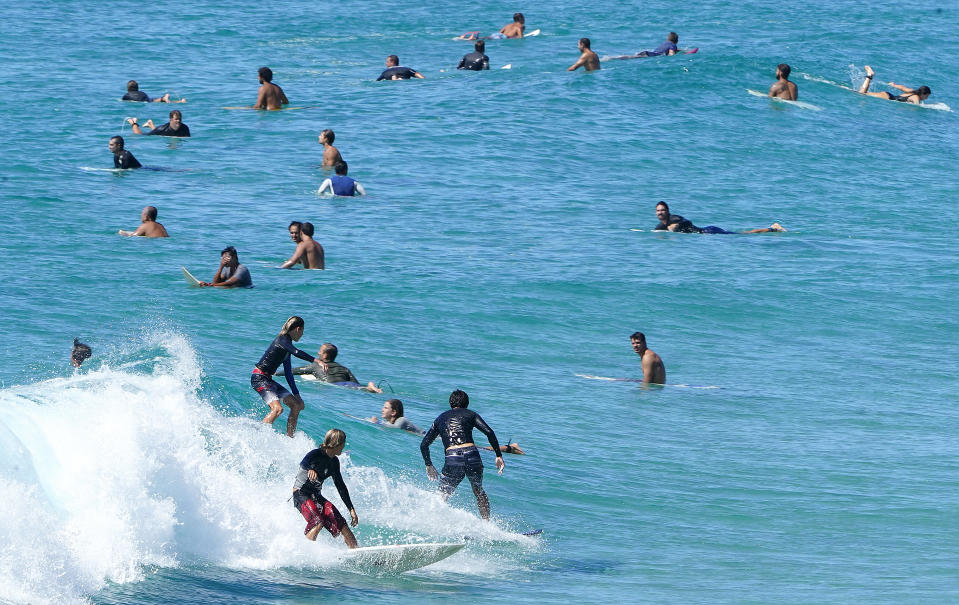'Still in very early stages': Fears of 'second wave' of coronavirus in Australia
Experts fear a “second wave” of coronavirus will strike Australia if people become complacent as a result of the gradual decline in confirmed cases.
While numbers have indicated a slight flattening of the curve, there are serious concerns of a huge spike in COVID-19 if Australians fail to remain vigilant with self isolation and social distancing.
The recent drop in cases was largely due to less people entering the country from overseas and only partially due to strict government measures put in place, clinical immunologist Professor Ian Frazer told Yahoo News Australia.

“If people get complacent then what will happen is that the people who are out there in the community, causing community spread at the moment, will spread to more people, and we’ll see the curve picking up again,” Prof Frazer said.
Coronavirus modelling reveals 'horror scenario' if Australia had done nothing
Australia now has 'three options' in fight against coronavirus
The city of 'biggest concern' as coronavirus modelling finally revealed
“We’re still at the very early stages of the epidemic, we’ve been seeded with a number of infected people and we don’t know where they all are, so there’s a fair chance there are people out there who are infectious.

“If we give up social distancing then we’ll see a new up-kick of the curve.”
Prof Frazer emphasised this was a very real possibility given the disturbing trend that had already begun in other places including in China’s Wuhan – the original epicentre of the deadly virus.
“We shouldn’t see ourselves as over the hump, we should see ourselves just on the upslope of the curve,” he said.
“Now foreigners and Chinese are coming back into China carrying the virus and therefore they’re going to see the problem that we possibly might see here.
“So it’s really important that people maintain the social distancing.”
Prof Frazer urged young people to be particularly mindful of their movements through the community as they were the ones most likely to be spreading the infection without knowing they even had it.

“If young people think they won’t get sick, it may be true, but they will give other people the infection because they are infectious even if they don’t have symptoms,” he said.
“We do know that if people don’t maintain social distancing then we can expect that there will be a much more rapid growth in the curve.”
Professor Mikhail Prokopenko, director of the Complex Systems Research Group at Sydney University, agreed that “a strong rebound” in cases could occur without persistent vigilance from Australians.
“Our model shows that on a current trajectory (that is, staying with 90% social distancing), we may get to near-zero, sporadic, cases, by the end of July,” Prof Prokopenko told Yahoo News Australia.
“There is a chance for a strong rebound, once/if the current measures are relaxed.”

He said this was avoidable with travel restrictions maintained for at least the next six months, and more efficient large-scale testing which he predicted was likely to become available within the next few months.
“It would be possible to trace and isolate new cases, and contain sporadic flare-ups,” he said.
‘It could all come undone’: Easter long weekend is crucial
Australia’s Chief Medical Officer Professor Brendan Murphy echoed the same concerns in a press conference on Tuesday, warning the public to stay home for the Easter long weekend.
“We’re not, in any way, out of trouble at the moment, but we’re in a relatively strong position to keep the pressure on and plan our next approach,” Prof Murphy told reporters.
“We know that the tools we are using do work, and we can scale them up and down as necessary, and the data we have now suggests they are working.
“We cannot relax what we’ve been doing. If we in any way lose that rigour that the community has embraced, particularly over Easter, it could all come undone.”
The daily increase in new cases has dropped to about three per cent on average, but the prime minister has also warned Australians not to be complacent.
“This Easter weekend will be incredibly important. Stay at home,” Scott Morrison said on Tuesday.
“Failure to do so this weekend will completely undo everything we have achieved so far together, and potentially worse.”
Do you have a story tip? Email: newsroomau@yahoonews.com.
You can also follow us on Facebook, Instagram and Twitter and download the Yahoo News app from the App Store or Google Play.



